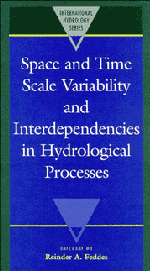Book contents
- Frontmatter
- Contents
- Acknowledgement
- OPENING ADDRESS OF THE FIRST GEORGE KOVACS COLLOQUIUM
- HETEROGENEITY AND SCALING LAND-ATMOSPHERIC WATER AND ENERGY FLUXES IN CLIMATE SYSTEMS
- SCALE PROBLEMS IN SURFACE FLUXES
- REMOTE SENSING – INVERSE MODELLING APPROACH TO DETERMINE LARGE SCALE EFFECTIVE SOIL HYDRAULIC PROPERTIES IN SOIL–VEGETATION–ATMOSPHERE SYSTEMS
- THE IMPORTANCE OF LANDSCAPE POSITION IN SCALING SVAT MODELS TO CATCHMENT SCALE HYDROECOLOGICAL PREDICTION
- THE INFLUENCE OF SUBGRID-SCALE SPATIAL VARIABILITY ON PRECIPITATION AND SOIL MOISTURE IN AN ATMOSPHERIC GCM
- MODELLING THE HYDROLOGICAL RESPONSE TO LARGE SCALE LAND USE CHANGE
- AN APPROACH TO REPRESENT MESOSCALE (SUBGRID-SCALE) FLUXES IN GCMs DEMONSTRATED WITH SIMULATIONS OF LOCAL DEFORESTATION IN AMAZONIA
- A HIERARCHICAL APPROACH TO THE CONNECTION OF GLOBAL HYDROLOGICAL AND ATMOSPHERIC MODELS
- STOCHASTIC DOWNSCALING OF GCM-OUTPUT RESULTS USING ATMOSPHERIC CIRCULATION PATTERNS
- DEPENDENCIES OF SPATIAL VARIABILITY IN FLUVIAL ECOSYSTEMS ON THE TEMPORAL HYDROLOGICAL VARIABILITY
- PROBLEMS AND PROGRESS IN MACROSCALE HYDROLOGICAL MODELLING
- PREDICTABILITY OF THE ATMOSPHERE AND CLIMATE: TOWARDS A DYNAMICAL VIEW
- FROM SCALAR CASCADES TO LIE CASCADES: JOINT MULTIFRACTAL ANALYSIS OF RAIN AND CLOUD PROCESSES
- FRACTALS ET MULTIFRACTALS APPLIQUÉS À L'ÉTUDE DE LA VARIABILITÉ TEMPORELLE DES PRÉCIPITATIONS
PREDICTABILITY OF THE ATMOSPHERE AND CLIMATE: TOWARDS A DYNAMICAL VIEW
Published online by Cambridge University Press: 05 November 2011
- Frontmatter
- Contents
- Acknowledgement
- OPENING ADDRESS OF THE FIRST GEORGE KOVACS COLLOQUIUM
- HETEROGENEITY AND SCALING LAND-ATMOSPHERIC WATER AND ENERGY FLUXES IN CLIMATE SYSTEMS
- SCALE PROBLEMS IN SURFACE FLUXES
- REMOTE SENSING – INVERSE MODELLING APPROACH TO DETERMINE LARGE SCALE EFFECTIVE SOIL HYDRAULIC PROPERTIES IN SOIL–VEGETATION–ATMOSPHERE SYSTEMS
- THE IMPORTANCE OF LANDSCAPE POSITION IN SCALING SVAT MODELS TO CATCHMENT SCALE HYDROECOLOGICAL PREDICTION
- THE INFLUENCE OF SUBGRID-SCALE SPATIAL VARIABILITY ON PRECIPITATION AND SOIL MOISTURE IN AN ATMOSPHERIC GCM
- MODELLING THE HYDROLOGICAL RESPONSE TO LARGE SCALE LAND USE CHANGE
- AN APPROACH TO REPRESENT MESOSCALE (SUBGRID-SCALE) FLUXES IN GCMs DEMONSTRATED WITH SIMULATIONS OF LOCAL DEFORESTATION IN AMAZONIA
- A HIERARCHICAL APPROACH TO THE CONNECTION OF GLOBAL HYDROLOGICAL AND ATMOSPHERIC MODELS
- STOCHASTIC DOWNSCALING OF GCM-OUTPUT RESULTS USING ATMOSPHERIC CIRCULATION PATTERNS
- DEPENDENCIES OF SPATIAL VARIABILITY IN FLUVIAL ECOSYSTEMS ON THE TEMPORAL HYDROLOGICAL VARIABILITY
- PROBLEMS AND PROGRESS IN MACROSCALE HYDROLOGICAL MODELLING
- PREDICTABILITY OF THE ATMOSPHERE AND CLIMATE: TOWARDS A DYNAMICAL VIEW
- FROM SCALAR CASCADES TO LIE CASCADES: JOINT MULTIFRACTAL ANALYSIS OF RAIN AND CLOUD PROCESSES
- FRACTALS ET MULTIFRACTALS APPLIQUÉS À L'ÉTUDE DE LA VARIABILITÉ TEMPORELLE DES PRÉCIPITATIONS
Summary
ABSTRACT Geophysical phenomena are often characterized by complex, random looking deviations of the relevant variables from their average values. Traditional approaches attribute this complexity to external uncontrollable factors and to poorly known parameters, whose presence tends to blur some fundamental underlying regularities. In this paper we consider that complexity might be an intrinsic property generated by the nonlinear character of the system's dynamics. Bifurcations, chaos and fractals, three important mechanisms leading to complex behaviour in nonlinear dynamical systems, are reviewed and the role of the theory of nonlinear dynamical systems as a major tool of interdisciplinary research in geosciences is stressed. The general ideas are illustrated on the dynamics of fluctuation-induced transitions between multiple climatic states with special emphasis on Quaternary glaciations.
INTRODUCTION
Much of our understanding of the earth's past environmental and climatic conditions rests on the ability to decipher geological or atmospheric data. Now, a typical time series obtained from such data displays considerable complexity, reflected by the lack of any obvious periodicity and by the occurrence of random-looking excursions of the relevant variables from their average level. A question of obvious concern is, therefore, how to decipher the message of such a time series and how to attribute to the systematic effects and to the randomness the roles that they actually deserve.
Information
- Type
- Chapter
- Information
- Publisher: Cambridge University PressPrint publication year: 1995
